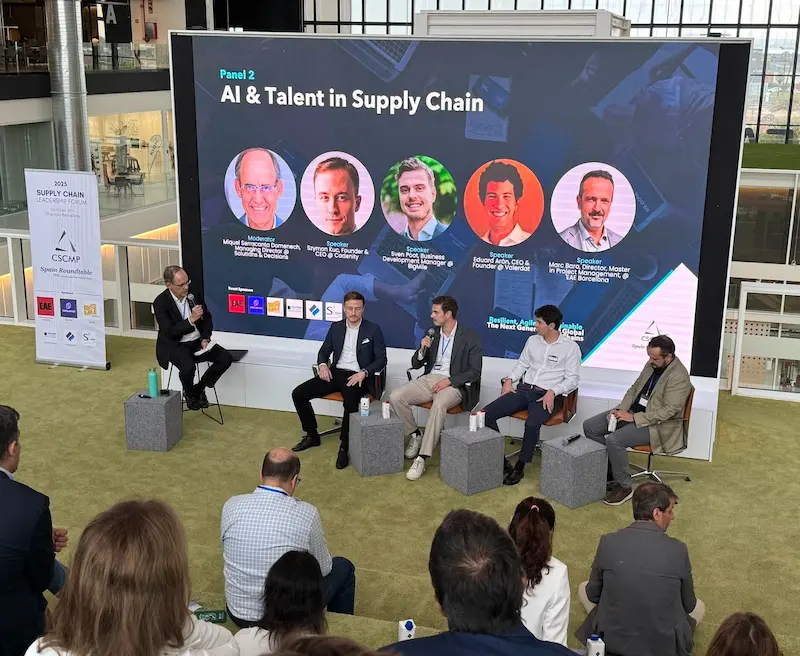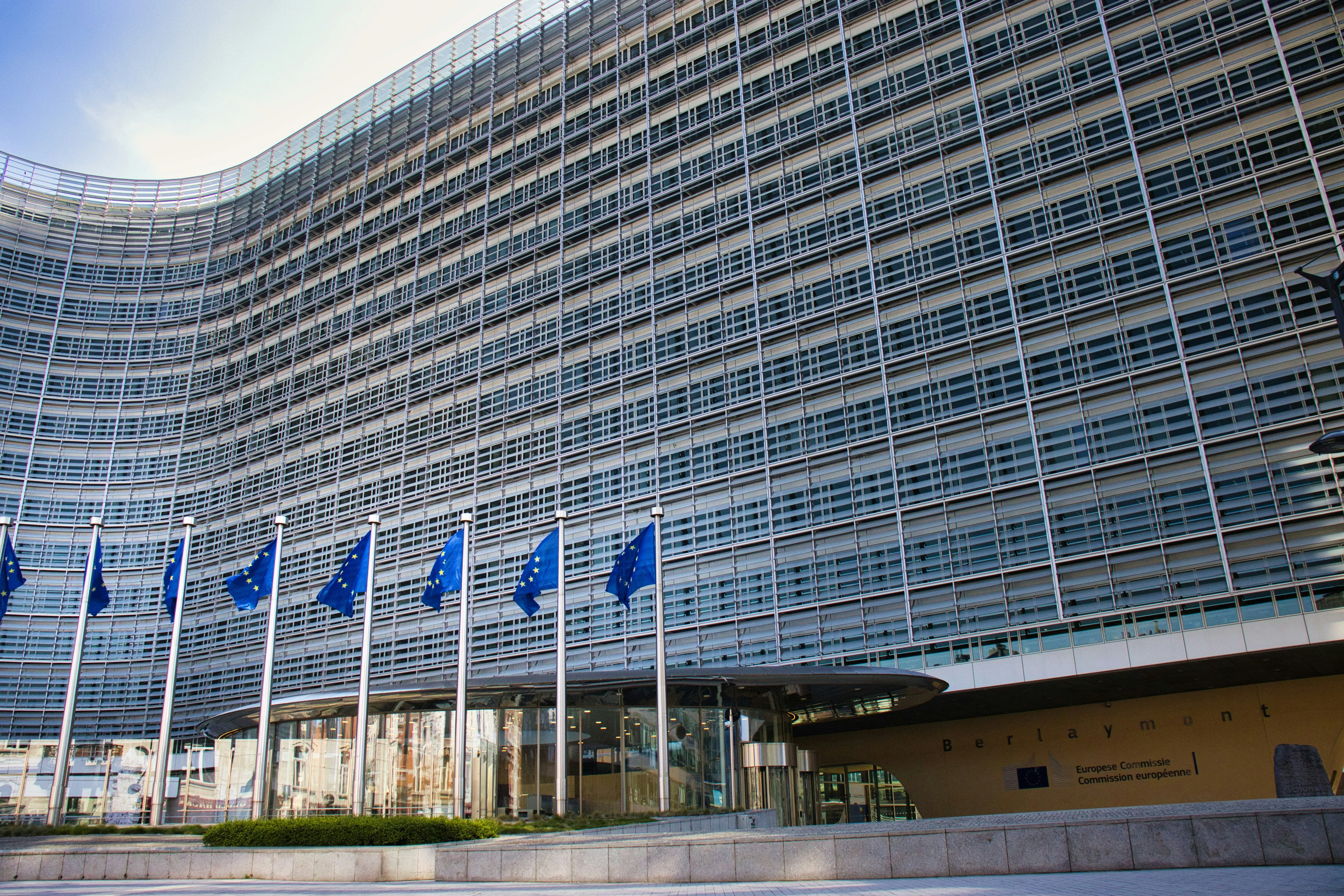How AI and sustainability are impacting the transport and logistics sector
After spending 5 years helping customers across Benelux to get started with carbon accounting, Sven Poot moved to Spain to set up the company’s presence there. In this blog, he shares three insights based on what he’s noticed so far through attending industry events and meeting with transport and logistics professionals from across the region.

{{highlight-text}}

When I joined BigMile 5 years ago, sustainability was getting increasing recognition, and Artificial Intelligence was very new on the scene. Five years later and both of these topics are part of almost every conversation or panel talk at industry events. So it’ll be no surprise that my three insights from recent events relate directly to sustainability and AI, and the opportunities they present for companies with transport and logistics operations.
Insight #1: Sustainability has evolved from a “nice-to-have” to a strategic differentiator to win new business
The industry’s perspective towards sustainability has also changed a lot over the last few years. First we had a growing sentiment on the need to make transport, logistics, and other high emitting industries more sustainable, and with that came new regulations like the CSRD in Europe, ADR 80/04 in Australia, and more recently several new reporting requirements in the US and other regions.
But that rise came with a quick fall when many of these requirements were softened and geopolitics meant that sustainability returned to being a ‘nice-to-have’ for lots of companies rather than an essential part of their business.
And finally, in 2025, also because of regional regulations, such as the Royal Decree 214/2025 in Spain, the industry sentiment moved back towards sustainability being a must-have, but this time more because companies started seeing the true value of it for their business performance.
Of course some companies may still invest in sustainability mainly for compliance and some to ‘do the right thing’ but the majority are now fully investing in it because they see the impact in their results: from winning new tenders to keeping existing customers happy and finding ways to reduce OpEx.
In fact, 41% of LSPs, manufacturers, and retailers now include minimum ESG prequalification criteria in their tenders, and this is weighted between 5-20% in the bid evaluation, so sustainability is indeed a non-negotiable for more and more companies to stay profitable and grow their operations.

Take the HP case for example, HP embeds sustainability into the supply chain to strengthen profitability and long-term competitiveness. It drives circular product design, reuse, and take-back models that cut material costs and increase lifetime value.
As HP’s global 3D printing hub, Sant Cugat enables on-demand, low-waste and near-customer production, reducing logistics and inventory costs. HP uses the GLEC Framework to measure transport emissions consistently and steer CO₂-reducing decisions across all freight modes.
The site also advances AI-driven forecasting and supply-chain optimization to improve resilience and reduce disruption risk. Energy-efficient facilities and renewable-focused operations further lower operating costs and support HP’s sustainability goals. Very inspiring and proof that sustainability drives both resilience and competitiveness.
We’re also seeing this with our clients at BigMile, such as Farm Trans and De Rijke Group, where measuring and reporting on carbon emissions has become part of their business as usual processes. It not only helps them reduce their carbon footprint and OpEx costs, but helps them gain new clients, earn certifications like the Lean & Green stars, and transparently share accurate sustainability data with their stakeholders.
Insight #2: AI has become an essential ingredient for operational and cost efficiency
Now onto the buzzword topic of AI. My first job in this industry involved solving big data and logistic-related issues for companies across Europe. Spending days sorting and analyzing data made me realize that so many (costly) mistakes could be avoided if there were less data entry errors, incorrect calculations, or misinterpretation of data.
Never mind the fact that manually inputting and sorting data is also very time-consuming, and that efficiency improvements are often overlooked as more time is spent managing data than analyzing it in-depth to spot trends etc.
It’s one of the reasons why more and more companies are turning to AI-powered SaaS solutions to more efficiently manage their logistics operations. But just to be clear, I’m talking about the solutions that are actually powered by AI rather than ones that just have AI stamped on their homepage!
These AI-powered solutions can help you:
- Analyze huge volumes of data in minutes
- Minimize the risk of data input or other human errors
- Replace manual admin work with automated workflows
- Identify trends or anomalies in your data, that could indicate a data error, an issue to be investigated, or an opportunity to increase efficiency
These are just some of the ways AI can help improve operational efficiency, but the possibilities are endless. And that leads me nicely on to another essential ingredient for success for transport and logistics companies: ensuring your team understands AI and how to use it effectively in their roles (otherwise you simply won’t get the full potential of AI).
Insight #3: Upskill your employees on AI, or you won’t get its full potential
There’s no doubt that AI is changing the way people work and there may be some fear that it’ll replace people’s jobs, but the reality is that if you learn how to properly use AI in your systems and processes, it’ll change your job not replace it.
We’ve all spent hours working on a spreadsheet that involved lots of data input, fixing calculations, and formatting it into presentable data views. Manual work like this can easily be replaced by AI.
This can be with an LLM where you import your data and ask it to analyze it for certain insights, or better yet, a SaaS solution (like I talked about above) that has AI built-in. Either way, you and your teams need to figure out which processes make sense to replace or augment with AI and develop guidelines and guardrails for its use across your teams and company.
It’s also important that your teams are trained in how to critically interpret the outcomes of AI tools, especially at the early stages when the AI tools are still learning your company’s details, processes, and ways of working.
That’s where you need to rely on you and your colleagues' industry and job-related expertise, as AI is only useful when you know exactly what you’re trying to do with it e.g. if you gave a social media manager access to AI, it doesn’t mean they can suddenly manage your fleet operations.
My advice is to not only equip teams with the AI-powered tools that can help them with their jobs, but to also invest time and energy in upskilling yourself and your team on best practices for using AI and how to critically analyze its output based on your inherent experience and expertise.
It’s a constant learning curve but with an open attitude to AI, experimentation, and knowledge sharing with your peers, you’ll be well positioned to use it efficiently and help your company gain a competitive edge.
Where is the industry headed in terms of sustainability and AI?
Without doubt, AI and sustainability are still very much the talk of the town at transport and logistics events in Spain and elsewhere, but the sentiment towards them is changing—and moving in a good direction. It finally feels like sustainability is firmly back on the agenda, thankfully this time as a true value driver, not a compliance box that needs to be ticked.
Companies cannot afford not to prioritize improving the sustainability of their operations, whether it's to avoid added costs (e.g. rising carbon taxes), stay competitive in the market, or improve the efficiency of their transport and logistics operations.
I’m also seeing more acceptance of the positive impact that AI can have on our day-to-day jobs, helping increase efficiency and giving us more time to focus on bringing value to the business in ways that only a human can. It is what you can achieve in the BigMile platform as well, by reducing data errors through our AI-powered intelligent importer. But remember, all these benefits are only possible if your teams are properly trained on using AI.
If you’d like to learn more about how BigMile can help you simplify the process of getting an accurate view of your emissions and take action to reduce your carbon footprint, optimize costs, and gain a competitive advantage, get in touch! Or catch me or the BigMile team at the next industry event.
In short: How a changing sentiment towards sustainability and AI are shaping the transport and logistics sector
After attending several logistics events in Spain over the past few weeks, one thing stood out: the future of AI and sustainability were dominating conversations. Here are three insights on how AI and sustainability are impacting transport and logistics companies:
- Sustainability has evolved from a “nice-to-have” to a strategic differentiator to win new business
- AI has become an essential ingredient for operational and cost efficiency
- Upskill your employees on AI, or you won’t get its full potential
In the article, I’ll go through each of these insights in more detail with some practical advice on the implications of each of these on transport and logistics companies.









